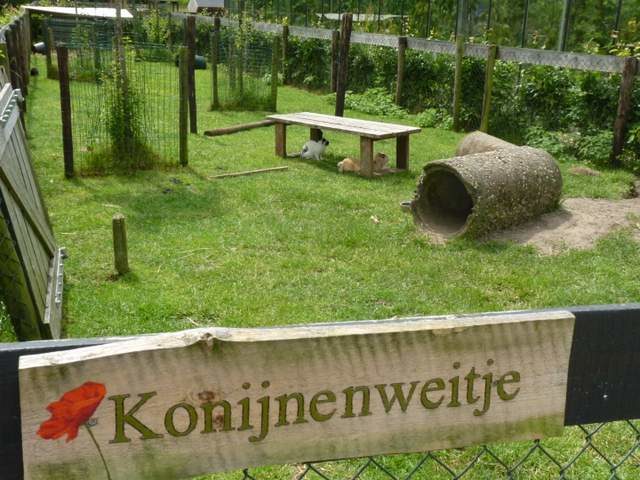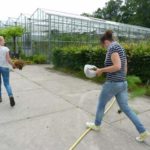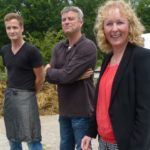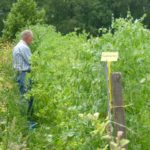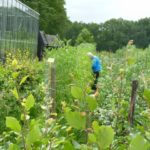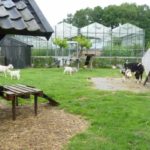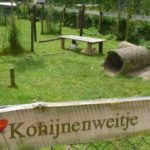‘t Paradijs
Caroline and IJsbrand Snoeij
Target group: Old people, children, professional people who are burnt out
Type of care: Day during the week and residential at the weekends
Farm: Cattle, production of organic fruit and vegetables.
Income sources: 35% of income from agricultural activity and 65% from Care activity
| Caroline and IJsbrand Snoeij never thought they would live in the countryside and run a Care and agricultural farm. “I have never wanted to be a farmer, even though IJsbrand had a higher diploma in agriculture and ran a company advising Care Farms, and now you see what has happened!” – Caroline laughs. It all started when Ijsbarnd got a proposal from an elderly couple to try to help to sell their farm which was also being operated as a Care Farm. He could not find a client for a very long time. One day IJsbrand took his wife to the farm. Caroline was astonished by the place. When they were leaving the owner asked the magic question: “Why don’t you buy it?”. However, they could not afford it. But one week later a buyer was found. Caroline thought that this was destiny when the buyer only decided to buy the farm on condition that IJsbrand would become the manager there. And this is how Caroline became a farmer.
Caroline used to work as a teacher and had experience working with children aged 4 – 12 . They both decided to specialize in working with autistic children who subsequently began visiting them at weekends. Subsequently more and more clients of the ex-owners started to come and ask whether they could provide them with care services. They therefore decided to also accept the elders. As a result Caroline and IJsbrand set up some facilities which permitted the participants to take part in the daily running of the farm. One of these was a strawberry plantation sited on a raised platform so they the participants did not have to bend down. There is something for everybody here. Apart from fruit and vegetables there is also animal husbandry here, such as the keeping of cows, pigs, sheep, goats, hens and rabbits. Those who do not want to participate in farm life can, on any given day, just rest in special rooms or sit in the café and drink coffee and enjoy the sight and sounds of the work being done on the farm. In addition to the elderly and children ‘t Paradijs is also visited by professional people who suffer from ‘burn out’ to help them regain balance in their lives. They also run an emergency kindergarden for small children. During the last 8 years they have hosted 18 children aged from 2 weeks to 8 years. Regardless of their ages and health problems the elderly attendees interact well with each other in such a relaxed natural environment. Caroline makes use of the cyclical phenomena which take place in the natural world for her educational and therapeutic work. She has helped many people by demonstrating with examples from the daily life of the animals and plants growing on the farm. One of the attendees, a boy suffering from autism ceased having problems relating to his peers at school because of the example he witnessed of a group of cows living in t’ Paradijs -he grew to understood that everybody in a group is important even though not everybody has the same position in society. On the 17 ha agricultural farm in addition to the agricultural and Care activities there is an organic food shop selling items produced by t’Paradijs. They employ 13 people who help with every aspect of life on the farm, and are also supported by 7 volunteers. At the moment they have 140 participants (70 children, 40 elderly and 30 adults with psychological problems). Some attend on a daily basis whilst others come for one weekend a month. On a daily basis they can host a maximum of 8 adults, 15 elderly and 10 children. These limits are determined by the farms infrastructure, and are necessary in order to ensure the comfort and safety of the participants. People attend in order to find some peace in nature and to interact with others of a similar disposition. In spite of the fact that Caroline and IJsbrand employ specialists (social workers and child carers) they also seek to improve their own specialist skills. They also provide courses for their workers. The farm and the farm manager are central to any care activity. Therefore, IJsbrand also has his farm helpers who help him to work with the participants, the livestock, and the plants. All activities are supervised and supported by either the farmer himself or his helpers. |
“Farms have been providing care services for a long time. In the past those who were mentally disabled could work on the farm for food and accommodation and could feel that they were accepted”
“Animals accept you as you are, therefore they have an incredible power in treating people” “We note what can be offered by the village to the city and vice versa” “We are very strict in conforming to the safety regulations, if we did not we would not be allowed to let the children attend and we would have to close the farm.” “We grow strawberries in hanging baskets so that the elderly do not have to bend” “The host has to listen to and take into consideration the needs of the participants” “Our participants discover the things that they cannot find in their everyday hectic lives: patience, understanding, time and inner peace” |

